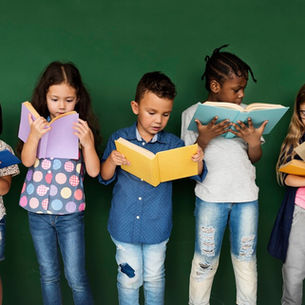The Magic of Words: How Children's Literature Shapes Young Minds
- Rungeen Singh

- Feb 19, 2025
- 3 min read
Updated: 4 days ago
In the tapestry of human development, few threads are as vibrant and enduring as the stories we encounter during childhood. Children's literature holds a special place in shaping young minds, offering not just entertainment but a foundation for growth, empathy, and understanding. The magic of words transcends mere storytelling, weaving lessons and dreams into the fabric of a child's imagination and cognitive development.

Building Blocks of Imagination
Children's literature serves as the gateway to boundless creativity. Stories transport young readers to fantastical worlds, encouraging them to dream beyond the confines of their everyday lives. Whether it’s a whimsical journey with talking animals or a brave adventure in a far-off kingdom, these tales expand the horizons of a child's imagination. The vivid characters and settings in children’s books help young minds visualize and create mental images, a skill crucial for cognitive growth and problem-solving later in life.
Emotional Growth Through Stories
Books for children often explore themes of love, kindness, courage, and resilience. These narratives allow young readers to experience emotions vicariously, helping them to process their own feelings. For instance, when a character overcomes fear or learns to embrace differences, children absorb these lessons, applying them to their own challenges. Emotional intelligence, an essential life skill, is often cultivated through such indirect learning.
Teaching Empathy and Social Skills
Through the eyes of diverse characters, children learn to understand perspectives different from their own. A story about a lonely elephant seeking friendship or a misunderstood child trying to fit in teaches readers about compassion and the value of human connections. This ability to empathize, fostered early, contributes to forming kind and socially conscious individuals.
Language Development and Cognitive Skills
The rhythm, rhyme, and repetition often found in children’s books are instrumental in language development. Reading aloud to children helps them associate words with sounds, improving vocabulary and comprehension. Additionally, the structured yet imaginative narratives encourage critical thinking, as children begin to predict outcomes, connect events, and question motives within the story.
Bridging Generations
Children’s literature often serves as a bridge between generations. Parents and grandparents pass down beloved stories, creating a shared cultural and emotional bond. These books become family heirlooms, rich with memories of bedtime readings and animated discussions. This intergenerational sharing not only reinforces family ties but also preserves cultural heritage.
Preparing for Life’s Challenges
In today’s complex world, children face numerous challenges, from bullying to the pressures of social media. Well-crafted children’s books address these issues in a way that is accessible and relatable. Stories that feature characters overcoming adversity can inspire courage and resilience in young readers, equipping them with the tools they need to navigate life’s hurdles.
Rungeen Singh’s Contribution to Children’s Literature
Mrs. Rungeen Singh, a prolific writer with over 200 books to her credit, exemplifies the transformative power of children's literature. Her stories, imbued with humor, creativity, and life lessons, resonate deeply with both children and adults. Through her work, she has helped countless young minds grow into empathetic, confident, and imaginative individuals. Her dedication to understanding the psychology of children ensures that her books are not just stories but guides for navigating the complexities of growing up.
The Everlasting Magic
The magic of words lies in their ability to linger long after the pages have been turned. The lessons, characters, and dreams introduced in childhood shape not just the individual but also the world they help create. By nurturing young minds through literature, we plant seeds of empathy, imagination, and resilience, ensuring a brighter future for generations to come.
As parents, educators, and guardians, it is our responsibility to introduce children to the wonders of books. The stories they read today will echo in their hearts and minds for a lifetime, proving that the magic of words is indeed timeless.



























